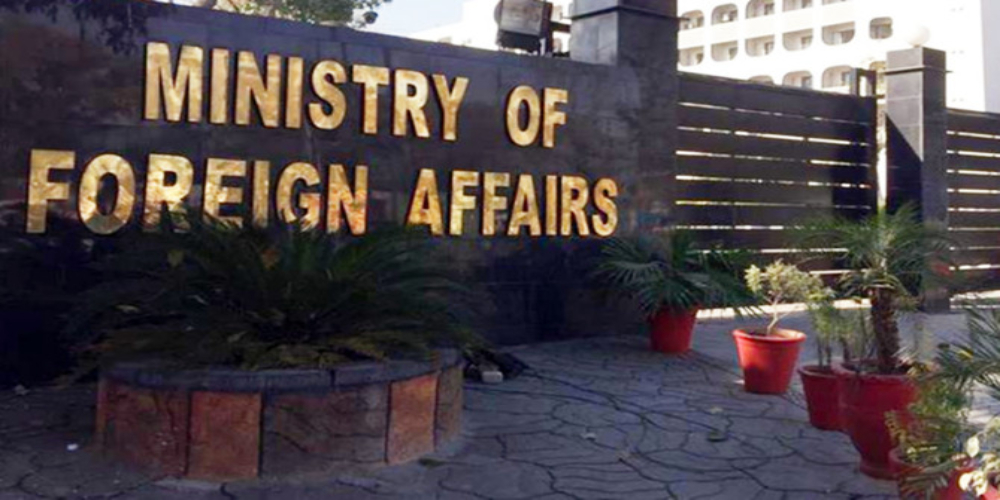By Our Diplomatic Correspondent
ISLAMABAD: The Foreign Office (FO) on Saturday offered a severe rebuke of Indian Home Minister Amit Shah’s “brazen disregard” for global agreements after the latter said India would never restore the Indus Waters Treaty (IWT) with Pakistan.
On April 23, Delhi unilaterally suspended its participation in the 1960 Indus Waters Treaty, which governs the use of the Indus river system, following the deaths of 26 civilians in India-held Kashmir.
Delhi accused Islamabad of orchestrating the attack without providing evidence, while Islamabad rejected the claims and demanded an impartial investigation. Despite a ceasefire agreed upon last month by the two nuclear-armed neighbors after their heaviest clashes in decades, the treaty remains inactive.
“No, it will never be restored,” Shah told The Times of India earlier. “We will take water that was flowing to Pakistan to Rajasthan by constructing a canal. Pakistan will be starved of water that it has been getting unjustifiably.” Responding to Shah’s comments, FO spokesperson Shafqat Ali Khan said they showed “a brazen disregard for the sanctity of international agreements” and noted that the IWT is an apolitical agreement without provisions for unilateral action.
“India’s illegal announcement to hold the treaty in abeyance constitutes a clear violation of international law, the provisions of the treaty itself, and the fundamental principles governing inter-state relations,” the FO stated.
“Such conduct sets a reckless and dangerous precedent — one that undermines the credibility of international agreements and raises serious questions about the reliability and trustworthiness of a state that openly refuses to fulfil its legal obligations.”
The FO added that “weaponising water for political ends” is irresponsible and contrary to the behaviour of a responsible state. It demanded that India immediately restore the full implementation of the IWT.
“For its part, Pakistan remains firmly committed to the treaty and will take all necessary measures to protect its legitimate rights and entitlements under it,” the statement concluded.
Addressing a crowd of supporters on Friday night, PPP Chairman Bilawal Bhutto-Zardari had said that New Delhi must accept the IWT, warning that if it refused to honour the treaty, “we will fight another war and take all six rivers. We know how to defend our rivers.”
Earlier, Pakistan’s Foreign Office has categorically rejected claims made by Indian media that Islamabad requested a ceasefire during the recent bout of heightened tensions between Pakistan and India.
In an official statement, the Foreign Office spokesperson strongly denied reports circulated by Indian outlets suggesting that Pakistan had sought a ceasefire following alleged Indian aggression.
“The claims made by Indian media last night are baseless and categorically denied,” the spokesperson stated, emphasising that Deputy Prime Minister and Foreign Minister Senator Ishaq Dar had already clarified in various interviews and statements that Pakistan’s response to Indian aggression was firm and decisive—an exercise of its legitimate right to self-defense.
The Foreign Office further elaborated that the eventual ceasefire was facilitated through the diplomatic engagement of friendly nations, particularly Saudi Arabia and the United States.
According to the official timeline, on May 10, 2025, at 8:15 AM, U.S. Secretary of State Marco Rubio contacted Senator Dar and informed him that India was willing to agree to a ceasefire, contingent on Pakistan’s consent.
Senator Dar affirmed Pakistan’s willingness to reciprocate the ceasefire offer. Shortly thereafter, at 9:00 AM, Saudi Foreign Minister Prince Faisal bin Farhan also reached out to Senator Dar, confirming India’s position and seeking Pakistan’s stance.
The spokesperson stressed that throughout the crisis, Pakistan maintained a consistent position: it exercised its right to self-defense and did not request a ceasefire, but responsibly accepted diplomatic engagement when the opportunity presented itself.
“Pakistan did not appeal for ceasefire, it responded decisively, then acted as a responsible state when approached with a genuine diplomatic solution,” the statement concluded.



